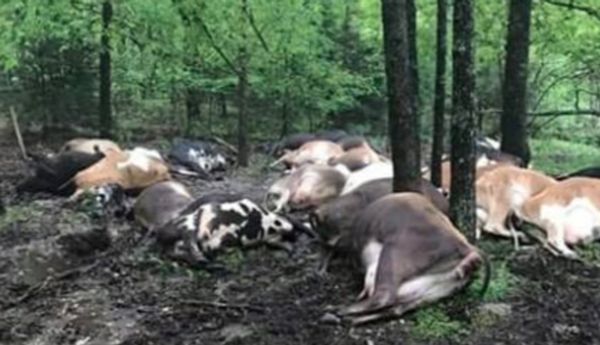When severe weather wreaked havoc across Missouri, one farmer, Jared Blackwelder from Springfield, was hit with an unimaginable tragedy. The recent storm left him devastated and heartbroken.

On a typical Saturday morning, Jared and his wife Misty went about their daily routine of feeding their beloved dairy cows. Unbeknownst to them, a storm was brewing in the distance. Ignoring the rumble of thunder and flashes of lightning, they pushed forward with their chores.Later that day, as Jared headed back to the p asture to gather the cows for their evening milking, he was met with a horrifying sight—32 lifeless bodies of his cows piled on top of each other. “It’s a truly tragic event. It’s something that happens occasionally, but what made this even worse was the sheer number of cows affected,” shared Stan Coday, president of the Wright County Missouri Farm Bureau. A local veterinarian confirmed that the cause of death was lightning. It is believed that the cows sought shelter together behind a group of trees during the storm, unaware of the impending disaster.Jared was not alone in his grief. Coday, who had lost a cow to lightning in the past, empathized with the profound impact this kind of loss has on a farmer. He acknowledged that this was an event beyond Jared’s control, a cruel hand dealt by Mother Nature. Besides the emotional toll, the financial blow is significant. Each certified organic cow had an estimated value of $2,000 to $2,500. With a total of 32 cows lost, the financial loss equated to nearly $60,000. While insurance may provide some relief, the uncertainty surrounding coverage only adds to the distress. “Most farmers don’t carry insurance. When you lose a cow, you’ve lost everything,” explained Coday, highlighting the risky nature of farming. Furthermore, neighbors who inquired about purchasing the meat from the deceased cows were informed that it was unfit for human consumption. Exposure to the elements for several hours rendered the animals unsuitable for processing.

